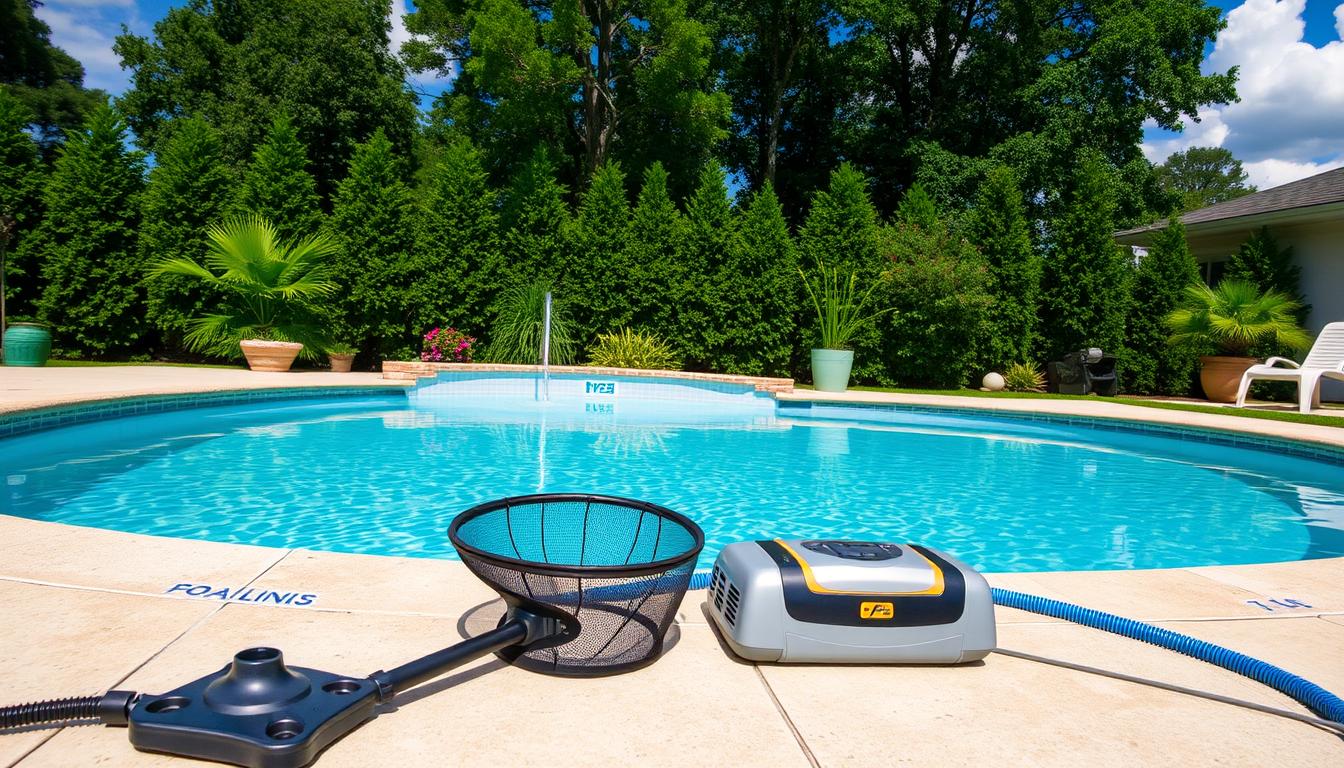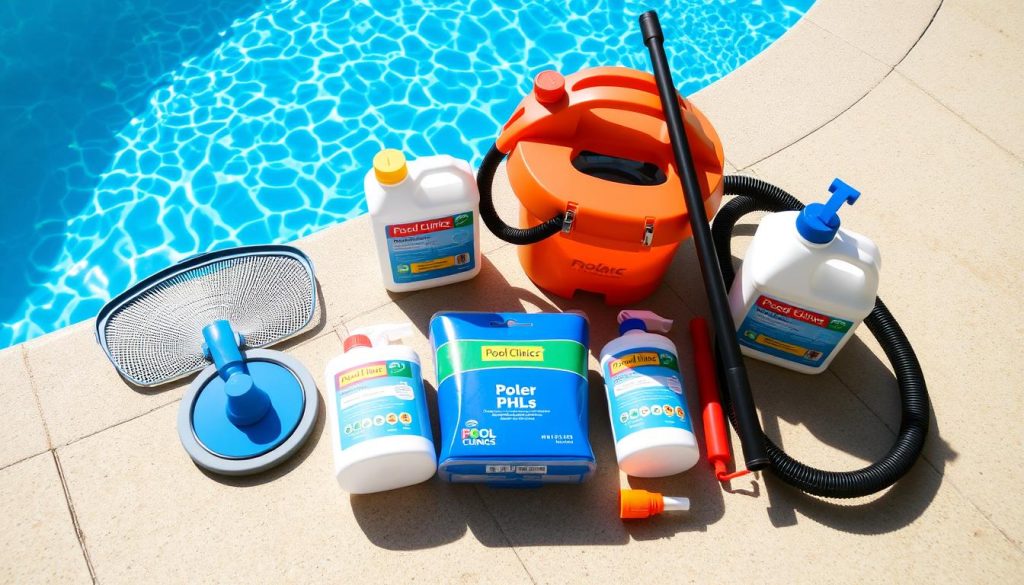
Pool upkeep involves more than just enjoying a refreshing swim. It requires time, effort, and know-how to keep your pool in top shape. Balancing water chemistry, cleaning filters, and skimming debris are essential tasks.
Pool maintenance includes opening and closing your pool correctly. It also involves weekly and monthly upkeep routines. Opening your pool means removing and cleaning the cover, filling it with water, and balancing chemicals.
Weekly tasks include cleaning debris, vacuuming, and testing water chemistry. Adding cleaning chemicals, checking filters, and water levels are also important. Shocking the water may be necessary at times.
Monthly maintenance involves checking calcium hardness and dissolved solids. Cleaning the filter, inspecting the pool surface, and equipment are crucial. Regular safety inspections should also be conducted.
Understanding pool maintenance basics can make the process more manageable. Investing in the right equipment, like variable-speed pumps, can save on electric bills. Learning ideal chemical levels helps maintain pristine pool water.
Proper pH levels should be between 7.4 and 7.6. Alkalinity should range from 100 to 150 ppm. Chlorine levels should be maintained between 1 and 3 ppm.
Key Takeaways
- Pool maintenance involves opening and closing your pool properly, as well as weekly and monthly maintenance routines.
- Weekly tasks include cleaning debris, vacuuming, testing water chemistry, adding cleaning chemicals, checking the filter and water levels, and shocking the water when necessary.
- Monthly maintenance involves checking calcium hardness and dissolved solids, cleaning the filter, inspecting the pool surface and equipment, and conducting safety inspections.
- Investing in the right pool equipment and understanding ideal chemical levels can make pool maintenance more manageable.
- While pool maintenance requires time and effort, establishing a regular routine can help keep your pool in top shape.
Understanding the Basics of Pool Maintenance
Pool maintenance is key to a clean and safe swimming environment. Regular upkeep ensures long-lasting equipment and a healthier pool. It creates an inviting backyard oasis for family and friends.
The Importance of Regular Pool Maintenance
Good pool care prevents harmful bacteria and algae growth. It keeps equipment like pumps, filters, and heaters working well. Regular maintenance also makes your pool look great.

Essential Pool Maintenance Equipment
Proper pool care requires the right tools. Here are some must-have items:
- Water testing kit: Used to monitor and adjust pool water chemistry
- Pool brush: Helps scrub pool walls and floors to prevent algae growth
- Pool vacuum: Removes debris and sediment from the pool floor
- Skimmer net: Collects floating debris from the pool surface
- Pool filter: Removes small particles and contaminants from the water
- Pool pump: Circulates water through the filter and maintains proper water flow
- Pool heater: Warms the water to a comfortable temperature for swimming
The Three C’s of Pool Maintenance: Circulation, Cleaning, and Chemistry
Good pool care focuses on three main areas: circulation, cleaning, and chemistry.
- Circulation: Run the pool pump for 8-12 hours daily. This prevents stagnant water and spreads chemicals evenly.
- Cleaning: Skim, brush, and vacuum regularly. This removes debris and stops algae growth.
- Chemistry: Keep the water balanced for comfort and safety. Here are the ideal ranges:
- pH: 7.4-7.6
- Free chlorine: 1-3 ppm
- Total alkalinity: 80-120 ppm
- Calcium hardness: 200-400 ppm
- Cyanuric acid (stabilizer): 30-50 ppm
| Filter Type | Cleaning Frequency | Cleaning Method |
|---|---|---|
| Sand Filter | Every 2 weeks or when pressure gauge rises 8-10 psi | Backwash the filter |
| Cartridge Filter | Every 2-6 weeks, depending on usage | Remove and manually clean cartridges |
| Diatomaceous Earth (DE) Filter | Every 2 months or when pressure gauge rises 8-10 psi | Backwash and recharge with fresh DE powder |
Follow these pool care basics for a clean and enjoyable swimming experience. Your pool will stay in great shape for years to come.
Weekly Pool Maintenance Tasks
A clean pool needs regular care. Weekly tasks keep it safe and fun. Let’s explore key weekly chores for a top-notch pool.
Skimming and Removing Debris
Skim your pool 2-3 times weekly. Use a net to remove leaves and bugs. This helps keep water clear and reduces filter strain.
Skimming also stops debris from sinking. It’s easier to remove floating items than sunken ones.
Vacuuming the Pool
Vacuum your pool floor weekly to remove settled dirt. This prevents stains and algae growth. Use a manual or automatic vacuum.
Vacuuming an average pool takes about 30 minutes. It’s a key part of keeping your pool clean.
Brushing Pool Walls and Tiles
Brush pool walls and tiles weekly. This stops algae and dirt buildup. Pay extra attention to corners, steps, and the waterline.
Brushing also spreads chemicals evenly. This makes them work better throughout the pool.
Testing and Adjusting Water Chemistry
Check water chemistry weekly for a safe swim. Use a test kit to check pH, chlorine, and alkalinity levels.
Ideal ranges are:
- pH levels: 7.2 – 7.8
- Chlorine: minimum 1 ppm
- Alkalinity: 80 – 120 ppm
Proper levels prevent skin irritation and equipment damage. They also ensure sanitizers work well.
Cleaning Skimmer Baskets and Pump Filters
Check and clean skimmer baskets and pump filters weekly. They’re vital for pool cleanliness.
Filter cleaning frequency depends on the type:
| Filter Type | Cleaning Frequency |
|---|---|
| Sand Filter | Backwash every 1-2 weeks |
| Cartridge Filter | Clean every 2-4 weeks |
| Diatomaceous Earth (DE) Filter | Backwash every 1-2 months |
Regular pool care keeps it clean and ready for fun. It also extends the life of your pool equipment.
How Hard Is It to Maintain a Pool?
Pool maintenance requires consistent effort and dedication. Most pool owners spend 1-2 hours weekly on basic tasks. These include skimming, vacuuming, brushing, and testing water chemistry.
Maintenance time can vary based on pool size and usage. Environmental conditions also play a role in determining upkeep needs.
Common Challenges in Pool Maintenance
Pool owners face several challenges in maintaining their pools. Algae growth is a frequent issue, especially in concrete pools with porous surfaces.
Cloudy water, leaks, and equipment problems can also occur. Balancing pool chemicals can be tricky and may lead to health hazards.
Maintenance costs can be significant. In-ground pools may require $450 to $1,200 yearly for upkeep. The average repair cost is around $900.
When to Consider Professional Pool Maintenance Services
Sometimes, professional pool maintenance services are beneficial. They can help with stubborn algae, recurring leaks, or complex equipment repairs.
If you lack time or energy for regular upkeep, professionals can keep your pool in top shape. They offer expertise in resolving problems quickly.
Professional services provide advice on upgrades and energy-efficient equipment. They can also recommend safety measures to enhance your pool experience.







